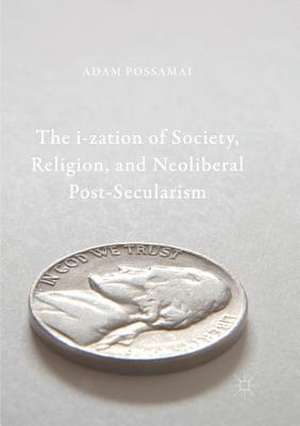The i-zation of Society, Religion, and Neoliberal Post-Secularism
Autor Adam Possamaien Limba Engleză Paperback – 23 dec 2018
This book explores the elective affinity of religion and post-secularism with neoliberalism. With the help of digital capitalism, neoliberalism dominates, more and more, all aspects of life, and religion is not left unaffected. While some faith groups are embracing this hegemony, and others are simply following the signs of the times, changes have been so significant that religion is no longer what it used to be. Linking theories from Fredric Jameson and George Ritzer, this book presents the argument that our present society is going through a process of i-zation in which (1) capitalism dominates not only our outer, social lives (through, for example, global capitalism) but also our inner, personal lives, through its expansion in the digital world, facilitated by various i-technology applications; (2) the McDonaldization process has now been normalized; and (3) religiosity has been standardized. Reviewing the new inequalities present in this i-society, the book considers their impact on Jurgen Habermas’s project of post-secularism, and appraises the roles that various religions may have in supporting and/or countering this process. It concludes by arguing that Habermas’s post-secular project will occur but that, paradoxically, the religious message(s) will be instrumentalized for capitalist purposes.
| Toate formatele și edițiile | Preț | Express |
|---|---|---|
| Paperback (1) | 417.14 lei 6-8 săpt. | |
| Springer Nature Singapore – 23 dec 2018 | 417.14 lei 6-8 săpt. | |
| Hardback (1) | 394.87 lei 6-8 săpt. | |
| Springer Nature Singapore – 16 noi 2017 | 394.87 lei 6-8 săpt. |
Preț: 417.14 lei
Nou
Puncte Express: 626
Preț estimativ în valută:
79.83€ • 82.84$ • 66.72£
79.83€ • 82.84$ • 66.72£
Carte tipărită la comandă
Livrare economică 17-31 martie
Preluare comenzi: 021 569.72.76
Specificații
ISBN-13: 9789811355301
ISBN-10: 9811355304
Pagini: 244
Ilustrații: XV, 244 p. 2 illus. in color.
Dimensiuni: 148 x 210 mm
Greutate: 0.32 kg
Ediția:Softcover reprint of the original 1st ed. 2018
Editura: Springer Nature Singapore
Colecția Palgrave Macmillan
Locul publicării:Singapore, Singapore
ISBN-10: 9811355304
Pagini: 244
Ilustrații: XV, 244 p. 2 illus. in color.
Dimensiuni: 148 x 210 mm
Greutate: 0.32 kg
Ediția:Softcover reprint of the original 1st ed. 2018
Editura: Springer Nature Singapore
Colecția Palgrave Macmillan
Locul publicării:Singapore, Singapore
Cuprins
1. Religions Aligned with Neoliberalism.- 2. Religions within Neoliberalism.- 3. Religious Alternatives to Neoliberalism.- 4. There is no such thing as a religion.- 5. Jameson (1):From Late Capitalism to Digital Capitalism.- 6. Jameson (2): From Pastiche to the Pygmalion Process.- 7. Ritzer (1): From The McDonaldization Thesis to the i-zation of Society.- 8. Ritzer (2) - Standardization and Branding.- 9. Habermas (1): A Neoliberal Post-secular Project.- 10. Habermas (2):Neoliberal Post-secularism and the i-zation of Society.- 11. Revising Religious Tax Exemption.- 12. Conclusions: A Global Compassionate Tax for the i-Society.
Recenzii
“Possamai’s analysis is well-presented, coherently and frequently convincingly argued, and above all interesting. … It makes a solid contribution to what is indeed a much larger and very much an ongoing discussion.” (Peter Beyer, Journal of Contemporary Religion, Vol. 34 (2), 2019)
Notă biografică
Adam Possamai is Professor in Sociology and Director of Research in the School of Social Sciences and Psychology at Western Sydney University. He is the (co)author and (co)editor of a dozen academic books, 5 novels, and close to 80 refereed articles and book chapters. He is the past President of the International Sociological Association’s Committee 22 on the Sociology of Religion. He has been a visiting Professor at the City University of New York and the École des Hautes Études en Sciences Sociales in Paris. His latest books are Religions, Nations and Transnationalism in Multiple Modernities (edited with Patrick Michel and Bryan Turner, 2017, Palgrave McMillan), Religion and Non-Religion among Australian Aboriginal Peoples (edited with James Cox, 2016, Routledge), The Sociology of Shari’a: Case Studies from Around the World (edited with James Richardson and Bryan Turner, 2015, Springer) and the novel L’histoire extraordinaire de Baudelaire (2017, Rivière Blanche).
Textul de pe ultima copertă
This book explores the elective affinity of religion and post-secularism with neoliberalism. With the help of digital capitalism, neoliberalism dominates, more and more, all aspects of life, and religion is not left unaffected. While some faith groups are embracing this hegemony, and others are simply following the signs of the times, changes have been so significant that religion is no longer what it used to be. Linking theories from Fredric Jameson and George Ritzer, this book presents the argument that our present society is going through a process of i-zation in which (1) capitalism dominates not only our outer, social lives (through, for example, global capitalism) but also our inner, personal lives, through its expansion in the digital world, facilitated by various i-technology applications; (2) the McDonaldization process has now been normalized; and (3) religiosity has been standardized. Reviewing the new inequalities present in this i-society, the book considers their impact on Jurgen Habermas’s project of post-secularism, and appraises the roles that various religions may have in supporting and/or countering this process. It concludes by arguing that Habermas’s post-secular project will occur but that, paradoxically, the religious message(s) will be instrumentalized for capitalist purposes.
Caracteristici
Updates the theory of Jameson from late capitalism to digital capitalism, and of Ritzer from the McDonalidisation of society to the i-zation of society Explores current theories on the standardisation and branding of religion Introduces new concepts such as the Pygmalion process Critiques the post-secular project and its inclusion in neoliberalism Analyses the place of religion in neoliberalism and proposal for a compassionate tax Includes supplementary material: sn.pub/extras
